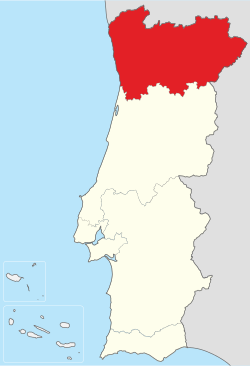North Region, Portugal
North Region is the most populous region in Portugal, higher population than Lisboa, and the third largest by area. 3,576,205 people live in this region according to the 2017 census. It is one of five regions of Mainland Portugal, most people live in the urban area of Porto, with about one million living there. There are also people living in urban areas in Northwestern Portugal, like Braga and Guimarães.[3]
North Region
Região do Norte | |
|---|---|
| Etymology: norte, Portuguese for north | |
 Location of the North Region in Portugal | |
| Country | |
| Region | North |
| Capital | Porto |
| Area | |
| • Total | 21,278 km2 (8,215 sq mi) |
| Population (2011) | |
| • Total | 3,689,173 (1st) |
| Time zone | UTC+0 (WET) |
| • Summer (DST) | UTC+1 (WEST) |
| HDI (2019) | 0.851[1] very high · 3rd |
| NUTS | PT11 |
| GDP (PPP) | 2013 estimate |
| - Total | € 61.745 billion[2] |
| - Per capita | € 16,900[2] |
| GDP (nominal) | 2013 estimate |
| - Total | € 48.148 billion[2] |
| - Per capita | € 13,200[2] |
| Statistics from INE (2005); geographic detail from Instituto Geográfico Português (2010) | |
Northern Portugal is a cultural region, it was first settled by various pre-Celtic and Celtic tribes before being visited by some Mediterranean civilizations who traded with the locals, including Greek, Carthaginians, Iberia was then invaded by the Romans and by Germanic peoples, and was attacked by the Moors, Berbers, Arabs and Vikings.
Geography
changeNorthern Portugal is a mountainous region. Locally known as serras include Serra do Gerês, Peneda, Marão and Soajo. There are some natural parks including the Peneda-Gerês National Park, Montesinho Natural Park, and the Alvão Natural Park.
References
change- ↑ "Sub-national HDI - Subnational HDI - Global Data Lab". globaldatalab.org. Retrieved 12 June 2021.
- ↑ 2.0 2.1 2.2 2.3 "EU Regions". Eurostat. Retrieved 2016-05-10.
- ↑ "CCDR-N Uma instituição SMART" (PDF). CCDR-N. Retrieved September 13, 2017.